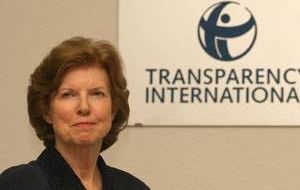MercoPress. South Atlantic News Agency
Chile and Uruguay the less corrupt and most transparent in Latinamerica
 Huguette Labelle, TI president: most countries failed the test
Huguette Labelle, TI president: most countries failed the test Chile and Uruguay are among the less corrupt and most transparent countries of the region while Venezuela stands at the opposite end, among the worst cases in the world, according to the latest annual report from Transparency International officially released in Berlin.
At world level Uruguay figures in position 24 in the 178 countries list that ranks “corruption perception”. Chile ranks 21, while a year ago (2009) together with Uruguay they both shared position 25.
Denmark, New Zealand, Singapore and Sweden are top of the TI list with the lowest “corruption perception” with Somalia (178), Burma (177) and Afghanistan (176) bottom of the list.
President Hugo Chavez Venezuela and in the process of becoming a Mercosur full member ranks 164, two points lower than last year’s position 162.
As to the other Mercosur members, Brazil stands at position 69 in the TI world ranking, but an improvement from last year’s 75.
Argentina on the other hand remains in the bottom half ranking, position 105, which is a one point advance over last year’s position 106.
Paraguay the other Mercosur full member occupied position 154 in 2009 and a year later is ranked 146. The landlocked country has a long tradition of strong “corruption perception”, particularly as a smuggling hub in the heart of South America, mainly to neighbouring Brazil and Argentina.
When President (and former bishop) Fernando Lugo took office in 2008, one of his main electoral promises was precisely to combat corruption.
Deeply ingrained in the country’s culture, the Paraguayan president does not seem to have advanced much on his promises to combat corruption.
Bolivia, Ecuador and Cuba (once thought to be an example of no-corruption) figure between the least transparent countries in the region and their positions have deteriorated in the last twelve months.
The TI report points out that corruption has a major impact on countries trying to combat financial instability, climate change and poverty.
“When governments are investing huge sums of resources to combat the world’s most urgent problems such as instability in financial markets, climate change and poverty, corruption remains as a major obstacle”, reads the report.
The report insists that governments must integrate measures to combat corruption in all fields, be it to address the financial crisis, climate change or eradicate poverty and strongly recommends the implementation of the United Nations Convention against Corruption, which it describes “as the only world initiative that can be a framework to finish with corruption”.
IT president Huguette Labelle said corruption “is not acceptable” because “many poor and vulnerable people continue to suffer its consequences worldwide”.
Regarding the so called rich countries, TI considers that since members of the Organization for Economic Cooperation and Development have practically remained in the same positions compared to last year’s report, it is clear evidence that “all countries must address the issue of corruption”.
If efforts are not undertaken globally, “political solutions” for many problems run the risk of not being applicable adds the TI report.
Since 1995 TI publishes an annual report on “corruption perception” with a ten point scale which begins at zero points for corrupt countries and 10 points for transparent members of the world community.




Top Comments
Disclaimer & comment rulesCommenting for this story is now closed.
If you have a Facebook account, become a fan and comment on our Facebook Page!